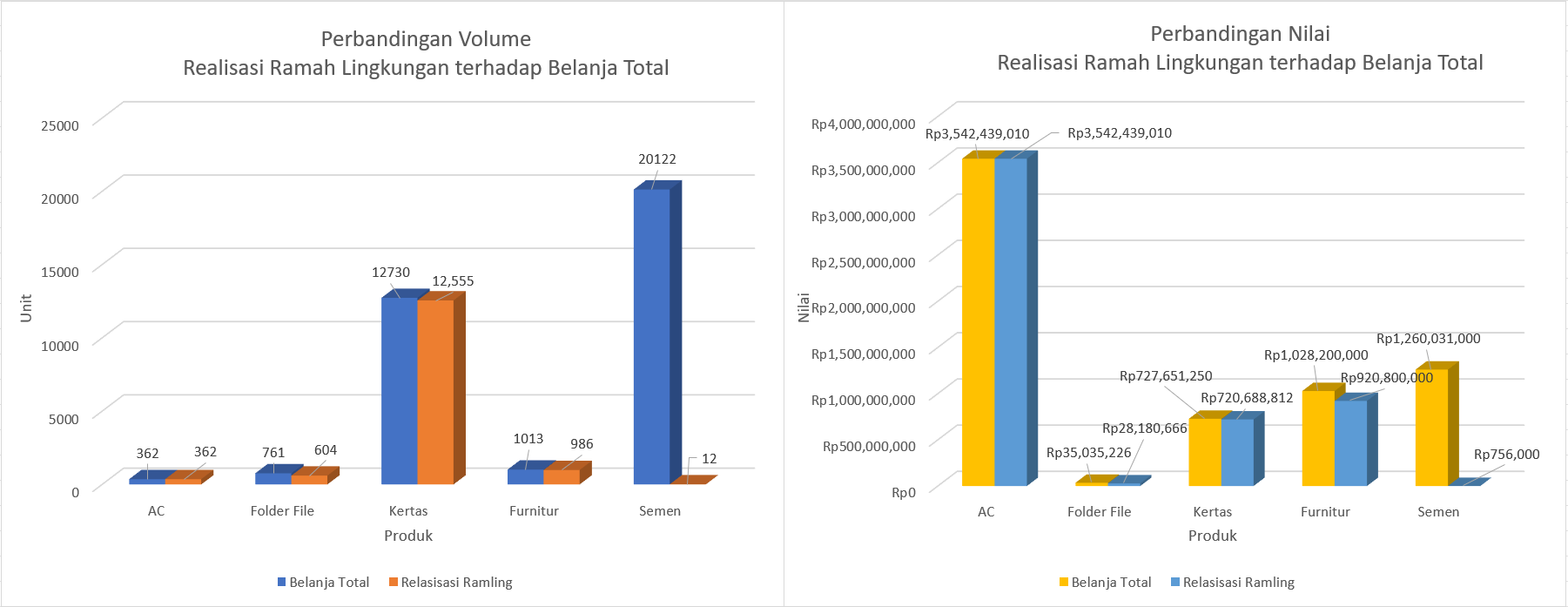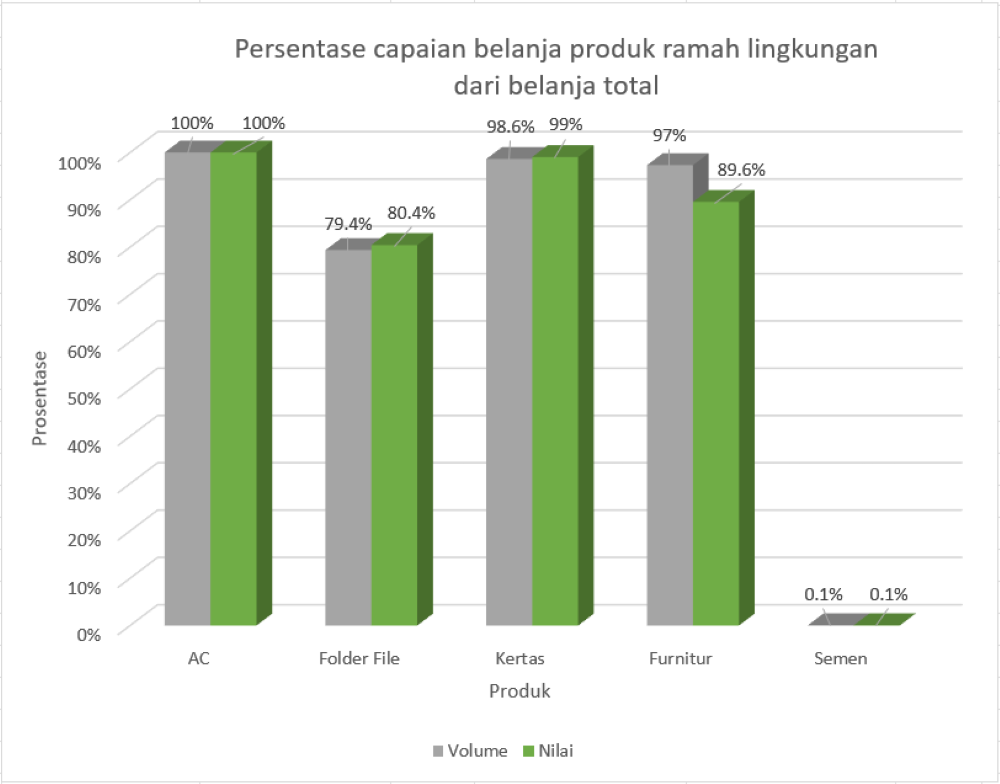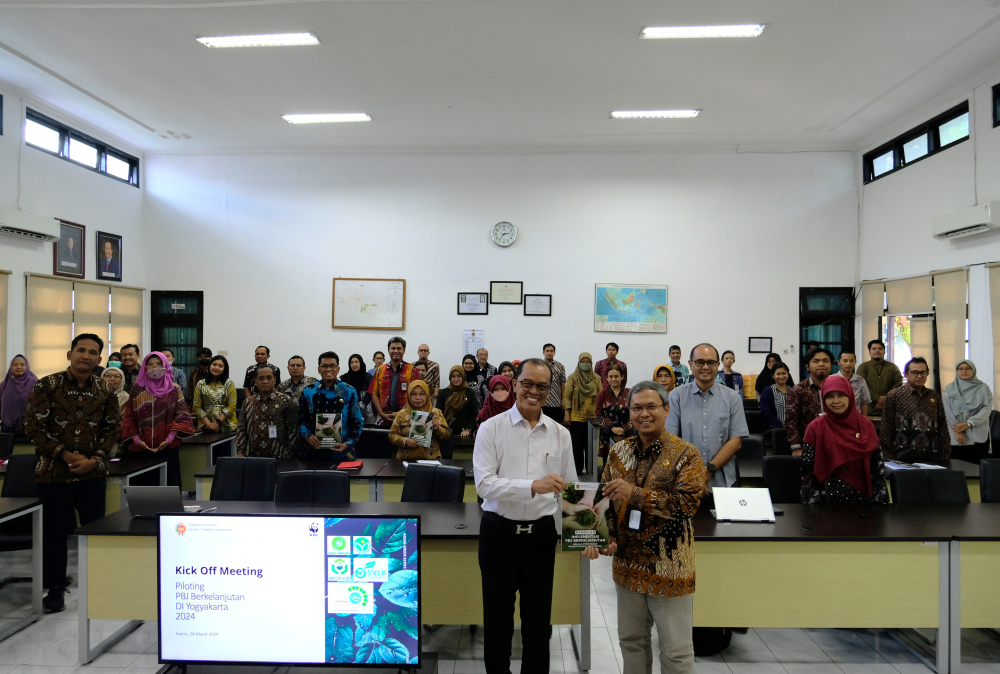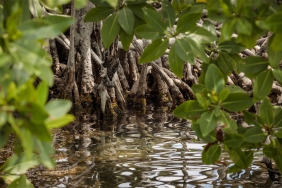YOGYAKARTA SPECIAL REGION STEPS FORWARD TOWARDS A GREEN PROVINCE: YOGYAKARTA SPECIAL REGION SUSTAINABLE PROCUREMENT REFLECTIONS
Sustainable procurement is a procurement concept that considers environmental, social, and environmental aspects. The goal is to meet the need for products and services at the best price, and optimize positive environmental, social and economic impacts.
On the other hand, Sustainable Procurement is an effort to encourage the use of products and services that have a low carbon footprint, such as the use of renewable energy, recycled raw materials, and energy efficient technologies. These things can certainly contribute to meeting the National Sustainable Develpoment Goals (SDGs) target, especially the 12th goal on sustainable consumption and production.
WWF-Indonesia as one of the conservation organizations in Indonesia, realizes that the Sustainable Goods/Services Procurement policy that has been established by the government has great potential and must be supported in promoting sustainability values, environmental preservation, and the welfare of future generations. The implementation of this policy not only supports environmental protection efforts but also creates positive long-term impacts for sustainable development.
The Regional Government (Pemda) of Yogyakarta Special Region (DIY) has made Sustainable Procurement a strategic initiative of Sustainable Development in Yogyakarta. This commitment is contained in the DIY Governor Regulation Number 57 of 2023 concerning Sustainable Procurement Implementation Roadmap 2023-2025, making DIY one of the provinces that initiated sustainable procurement policies and the first province in Indonesia to have a Sustainable Procurement Implementation Roadmap.
The Regional Secretary of Yogyakarta Special Region Drs. Beny Suharsono, M.Si. emphasized that the implementation of Sustainable Procurement in Yogyakarta Special Region is a form of commitment of the Regional Government to the fulfillment of Sustainable Development Goals and is also in line with the philosophy of development in Yogyakarta. "Sustainable Procurement of Goods/Services is a form of commitment of the Yogyakarta Regional Government to the fulfillment of Sustainable Development Goals as well as a tangible manifestation of the foundation of the development philosophy of the Special Region of Yogyakarta, Hamemayu Hayuning Bawono," he said when opening the Yogyakarta Special Region Sustainable Procurement Piloting series on March 28, 2024.
The roadmap of Yogyakarta Special Region Sustainable PBJ implementation includes strategic and comprehensive steps. First, capacity building is carried out through socialization and technical guidance / workshops to all parties involved in the procurement process including government officials and business product providers, the results of the Legality and Sustainability Verification Certification (SVLK) workshop for timber MSMEs, as many as 5 out of 30 participants already have SVLK certification and are ready to offer their goods in government procurement. In addition, a Norms, Standards, Procedures and Criteria (NSPK) document was developed as a technical guide for sustainable procurement.
The second is the development and improvement of environmentally friendly products, namely by adding an environmentally friendly product storefront to the DIY local e-catalog. In addition, the preparation of a proposal for the Standard Price of Goods and Services (SHBJ) for environmentally friendly products for 2026 was also carried out. From the preparation of the SHBJ, the results of the analysis show that environmentally friendly products have competitive prices so that they are feasible to be integrated in government spending.
Lastly, a pilot program at five OPDs was implemented using the procurement of environmentally friendly products, such as SVLK-certified furniture, energy-efficient air conditioners, and Green Industry Standard (SIH) certified cement. These efforts have succeeded in raising awareness and commitment to Sustainable Procurement among DIY local government agencies.
To ensure the effectiveness of the implementation of the aforementioned programs, the Yogyakarta Special Region Sustainable Public Procurement Implementation Team has conducted monitoring and evaluation (monev) of the implementation of Sustainable Public Procurement through the Yogyakarta Special Region Local Government's 2024 green product procurement survey. Of the 39 Regional Apparatus Organizations (OPD) surveyed, 25 OPDs or 64% have filled out the monev form from November 28-December 12, 2024. The 2024 procurement data analyzed is procurement data from January to October 2024 for 5 types of environmentally friendly products listed in the Minister of Environment and Forestry Regulation No. P5 of 2019, namely air conditioners (AC), file folders (ordener), paper, wood furniture, and cement.

The results of Yogyakarta Special Region government procurement survey in 2024 show that in general, the volume and value of purchases of environmentally friendly products in each product have a value that is not much different from the total expenditure, as seen in air conditioning products, file folders, paper and furniture. The highest volume realization of environmentally friendly products is Paper, which is 12,555 units (reams) of 12,730 units of total expenditure or reached 98.6%, followed by Furniture as many as 986 units of 1,013 units of total expenditure or reached 97%, then file folders as many as 604 units of 761 units of total expenditure or reached 79.4%, after which AC as many as 362 units of 362 units of total expenditure or reached 100%. While the realization of the value of environmentally friendly products the highest was the air conditioner which amounted to Rp3,542,439,010 of Rp3,542,439.010 total expenditure (100%), followed by furniture amounting to Rp920,800,000 of Rp1,028,200,000 total expenditure (89.6%), then paper amounting to Rp720,688,812 of Rp727,651,250 total expenditure (99%), after which file folders amounting to Rp28,180,666 of Rp35,035,225 total expenditure (80.4%). This shows that the purchase of environmentally friendly products can mostly be fully implemented by the Yogyakarta Special Region Government.

A different result is shown by cement products with a volume realization of only 12 units (sak) from a total of 20.122 units and value realization of only Rp756,000 out of a total of Rp1,260,031,000 (0.1%), this is due to the large difference in the price of SIH-certified cement with the standard price of goods currently set by the DIY Regional Government, so that only a small number of DPOs can buy.
Significant differences in cement products may be due to the survey method carried out based on procurement through e-purchasing while cement procurement is generally included in construction packages, where the potential value and volume of procurement is greater and the variety of brands used is diverse. However, the survey for construction packages in 2024 was not conducted due to the difficulty in determining the method for the volume and value of cement products in the construction package constituent factors.
Based on the survey results above, procurement in the DIY Regional Government has shown a commitment to sustainability by procuring environmentally friendly products. This step reflects awareness of the importance of maintaining ecosystem balance and reducing negative impacts on the environment. In addition, sustainable procurement efforts can also be a means to raise public awareness of the importance of sustainability issues. By setting a good example, the DIY Government can encourage changes in people's behavior towards a more environmentally friendly lifestyle.
The Yogyakarta Special Region government's procurement move to use environmentally friendly products is a clear example of commitment to sustainability. This action is expected to inspire other ministries, agencies, other local governments, even the private sector, as well as the general public, to participate in efforts to preserve the environment. The results of this survey also show that Yogyakarta Special Region government procurement has been using environmentally friendly products but the recording of the types of environmentally friendly products has not been done so that it is not recognized as an achievement of sustainable procurement.
The use of sustainable products in government procurement in the Yogyakarta Special Region LGU not only provides short-term benefits, but also makes a long-term contribution to the sustainability of the region. Some of the advantages of using environmentally friendly products include:
- Reduces greenhouse gas emissions: Eco-friendly products generally have a lower carbon footprint than conventional products. By using these products, the DIY Government is participating in efforts to reduce greenhouse gas emissions and address climate change.
- Sustainable natural resources: Eco-friendly products often use raw materials that come from sustainable or responsible sources and can be recycled. This helps to reduce the use of finite natural resources and preserve the environment.
- Creating a healthier environment: Environmentally friendly products tend not to contain harmful chemicals or toxic substances that can pollute the environment and endanger human health. By using these products, the DIY Government contributes to creating a healthier and safer environment for the community.
- Driving innovation and growth in the green economy: The demand for environmentally friendly products is driving innovation and the development of more sustainable technologies. This can create new opportunities in the green economy sector and support sustainable economic growth.
In closing, sustainable procurement is a positive step that needs to be appreciated and supported. It shows that the Yogyakarta Special Region Government is not only focused on economic development, but also has a high concern for environmental sustainability.
Sustainable procurement is a positive step that needs to be appreciated and supported.





